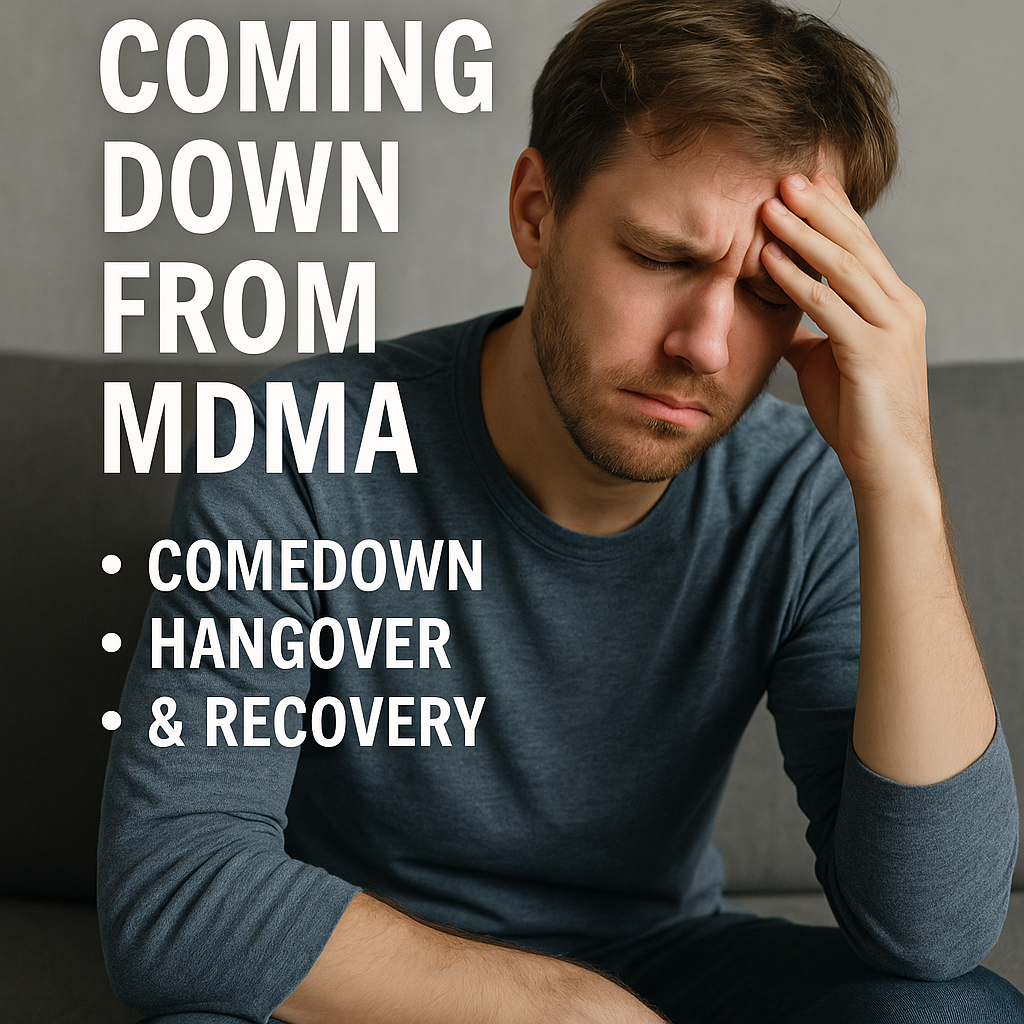Last Updated on October 20, 2025
Coming Down from MDMA: What to Expect and How to Cope
At a Glance: Coming Down from MDMA
- Explains what happens during the MDMA comedown, including physical and emotional side effects.
- Outlines how long the comedown typically lasts and what symptoms people may experience.
- Provides practical coping strategies to manage discomfort and reduce risks.
- Highlights the importance of seeking professional help if MDMA use leads to ongoing problems or dependency.
Table of Contents
MDMA, also known as ecstasy or molly, is a stimulant and hallucinogen that produces intense feelings of euphoria, empathy, and heightened sensory perception. While many people focus on the high, the comedown on MDMA can be physically and emotionally challenging. Symptoms such as fatigue, depression, anxiety, and sleep disturbances often follow use, making the days after just as important as the experience itself.










If you’ve heard MDMA or legal‑high tablets called a dancing pill, here’s why that label can be dangerous.
Understanding the MDMA comedown, sometimes described as an MDMA hangover, is essential for harm reduction and recovery. In this guide, we’ll explore what happens when you come down from MDMA, why it occurs, how long it lasts, and practical steps to manage symptoms. We’ll also look at the differences between coming down from ecstasy, cocaine, and other substances to provide a full picture.
What Is an MDMA Comedown?
A comedown from MDMA refers to the aftereffects that set in once the drug has worn off. MDMA increases the release of serotonin, dopamine, and norepinephrine in the brain, producing intense pleasure. However, this surge depletes natural supplies of these neurotransmitters, leading to a crash.
Typical MDMA comedown symptoms include:
- Fatigue or exhaustion
- Depressed mood or irritability
- Anxiety or restlessness
- Difficulty sleeping
- Headaches and dehydration
- Cognitive fog or difficulty concentrating
These effects may feel similar to a cocaine comedown or a coke hangover, though MDMA is more likely to cause prolonged mood changes due to serotonin depletion.
How Long Does an MDMA Comedown Last?
The duration of a comedown on MDMA can vary, depending on factors like dosage, frequency of use, hydration, and individual health.
- Short-Term Effects: Most users experience a crash within 24–48 hours after use.
- Lingering Effects: Some report mood disturbances lasting 3–7 days, especially after heavy or frequent use.
- Chronic Use Impact: Repeated binges or high doses can extend comedowns and increase the risk of depression or anxiety disorders.
Compared to a cocaine hangover, which typically resolves within 1–2 days, the MDMA comedown may feel more emotionally taxing.
Freedom Starts Here. Take Back Your Life Today.
Same-Day Admissions in Austin Available.
Why Does the MDMA Hangover Happen?
The MDMA hangover is largely due to chemical imbalances in the brain:
- Serotonin Depletion – MDMA causes a massive release of serotonin, leaving levels low after the high ends.
- Dopamine & Norepinephrine Changes – These neurotransmitters contribute to feelings of fatigue and irritability when depleted.
- Dehydration and Electrolyte Imbalance – MDMA raises body temperature, leading to sweating and fluid loss.
- Sleep Disruption – Stimulant effects prevent restful sleep, making exhaustion worse during the comedown.
This is why many describe the comedown from molly as a mix of physical exhaustion and emotional crash.
How to Come Down from MDMA More Smoothly
While there’s no way to completely avoid the comedown from MDMA, certain strategies can make it less severe.
1. Hydrate and Replenish
Drink water and electrolyte solutions to restore balance. Avoid overhydration, which can be dangerous with MDMA.
2. Rest and Sleep
Give your body time to recover. Even short naps can help reset your system.
3. Nutrition
Eat nutrient-rich foods, especially those high in tryptophan (turkey, eggs, nuts), which may support serotonin recovery.
4. Supplements
Some research suggests that antioxidants (vitamin C, vitamin E) and 5-HTP (a serotonin precursor) may help, but consult a doctor before use.
5. Emotional Support
Talk with trusted friends, join support groups, or consider counseling if mood issues persist.
6. Avoid Stimulant Use
Resist the temptation to offset fatigue with caffeine or other drugs, which can worsen anxiety.
Comparing Comedowns: MDMA vs. Cocaine
It’s helpful to understand the differences between coming down from MDMA and coming down from coke:
- Cocaine Comedown: Characterized by irritability, cravings, anxiety, and fatigue. Often shorter but more compulsive, leading to binge patterns.
- MDMA Comedown: More emotionally heavy, marked by serotonin depletion, sadness, and lingering low mood.
Both may be referred to as a hangover (i.e., cocaine hangover or MDMA hangover) but differ in chemical impact and duration.
Risks of Frequent Comedowns
Occasional MDMA use may lead to temporary mood dips, but frequent comedowns from molly or ecstasy can increase long-term risks:
- Depression – Repeated serotonin depletion may trigger persistent mood disorders.
- Memory Issues – Chronic use has been linked to cognitive impairment.
- Sleep Disorders – Repeated disruption of natural sleep cycles can affect health.
- Substance Use Disorder – Repeated attempts to avoid or manage comedowns can lead to dependence.
If you find yourself asking how to come down from cocaine or MDMA regularly, it may be a sign of a deeper problem.
Treatment and Support
If MDMA or cocaine use has become frequent, professional help may be necessary. Addiction treatment can include:
- Medical Detox: Helps manage withdrawal safely.
- Inpatient Rehab: Provides structure and therapy for long-term recovery.
- Outpatient Programs: Flexible care while maintaining work or family life.
- Support Groups: Peer encouragement and accountability through programs like SMART Recovery or 12-step groups.
For those struggling with repeated comedowns from molly, MDMA, or cocaine, seeking professional support is a vital step toward health and recovery.
How Nova Recovery Center Can Help with MDMA Addiction and Abuse
Nova Recovery Center provides comprehensive support for individuals struggling with MDMA addiction and abuse. Our programs focus on addressing the physical, psychological, and behavioral challenges that come with substance use. Through evidence-based therapies, clients learn healthier coping strategies and develop the tools necessary to break free from destructive patterns. We offer a full continuum of care, including detox, residential treatment, intensive outpatient programs, and sober living options, ensuring that recovery is supported at every stage. At Nova, we recognize that each person’s experience with MDMA is unique, so we create individualized treatment plans tailored to specific needs. Our team of experienced professionals works closely with clients to uncover underlying issues that contribute to drug use, such as trauma or mental health concerns. By combining clinical treatment with peer support and relapse prevention strategies, we help clients build a foundation for long-term sobriety. Ultimately, Nova Recovery Center empowers individuals to reclaim their lives and find lasting freedom from MDMA addiction.
FAQ: Coming Down from MDMA and Cocaine
What does it feel like to come down from MDMA?
It often feels like fatigue, sadness, anxiety, and difficulty sleeping — similar to an MDMA hangover.
How long does the MDMA comedown last?
Most people feel symptoms for 1–2 days, though mood effects can last up to a week.
How can I reduce the MDMA hangover?
Hydration, rest, nutrition, and emotional support are the best strategies.
Is a comedown from molly different than from ecstasy?
No. Molly and ecstasy are both MDMA, so their comedowns are similar.
What is a cocaine comedown like?
A cocaine comedown is marked by irritability, cravings, and fatigue, and often resolves faster than MDMA comedowns.
How do I come down from coke safely?
Rest, hydration, and avoiding further drug use are key. Seek medical advice if symptoms are severe.
Is smoking weed or drinking alcohol during a comedown helpful?
While some use substances to ease symptoms, this often worsens recovery and may increase risk of dependence.
When should I seek professional help?
If comedowns from MDMA or cocaine are frequent, severe, or interfere with daily life, professional treatment is recommended.
Other Drug and Alcohol Rehab Locations
Medical Disclaimer
The information on this page is intended for educational purposes only and should not be taken as a substitute for professional medical advice, diagnosis, or treatment. MDMA and other substances should never be used without proper medical guidance. Do not attempt to self-medicate, detox, or change any treatment plan without consulting a licensed healthcare provider. If you are experiencing severe side effects, withdrawal symptoms, or thoughts of self-harm, call 911 immediately in the United States or seek urgent medical attention. For immediate mental health support, you can call or text 988 to connect with the Suicide & Crisis Lifeline, available 24/7.
Nova Recovery Center Editorial Guidelines
By instituting a policy, we create a standardized approach to how we create, verify, and distribute all content and resources we produce. An editorial policy helps us ensure that any material our writing and clinical team create, both online and in print, meets or exceeds our standards of integrity and accuracy. Our goal is to demonstrate our commitment to education and patient support by creating valuable resources within our realm of expertise, verifying them for accuracy, and providing relevant, respectful, and insightful data to our clients and families.
- Atila, C., Straumann, I., Vizeli, P., Beck, J., Monnerat, S., Holze, F., Liechti, M. E., & Christ-Crain, M. (2024). Oxytocin and the role of fluid restriction in MDMA-induced hyponatremia: A secondary analysis of 4 randomized clinical trials. JAMA Network Open, 7(11), e2445278. https://doi.org/10.1001/jamanetworkopen.2024.45278. Accessed September 30, 2025.
- Baggott, M. J., Garrison, K. J., Coyle, J. R., Galloway, G. P., Barnes, A. J., Huestis, M. A., & Mendelson, J. E. (2016). MDMA impairs response to water intake in healthy volunteers. Advances in Pharmacological Sciences, 2016, 2175896. https://doi.org/10.1155/2016/2175896. Accessed September 30, 2025.
- Centers for Disease Control and Prevention. (2014). Illnesses and deaths among persons attending an electronic dance-music festival—New York City, 2013. Morbidity and Mortality Weekly Report, 63(50), 1195–1198. https://www.cdc.gov/mmwr/preview/mmwrhtml/mm6350a3.htm. Accessed September 30, 2025.
- Curran, H. V., & Travill, R. A. (1997). Mood and cognitive effects of ±3,4-methylenedioxymethamphetamine (MDMA, “ecstasy”): Week-end “high” followed by mid-week low. Addiction, 92(7), 821–831. https://pubmed.ncbi.nlm.nih.gov/9293041/. Accessed September 30, 2025.
- European Union Drugs Agency (EUDA). (2024, June 11). MDMA: The current situation in Europe (European Drug Report 2024). https://www.euda.europa.eu/publications/european-drug-report/mdma-current-situation-europe_en. Accessed September 30, 2025.
- Makunts, T., Jerome, L., Abagyan, R., & de Boer, A. (2022). Reported cases of serotonin syndrome in MDMA users in FAERS database. Frontiers in Psychiatry, 12, 824288. https://doi.org/10.3389/fpsyt.2021.824288. Accessed September 30, 2025.
- McKetin, R., Copeland, J., Norberg, M. M., Bruno, R., Hides, L., & Khawar, L. (2014). The effect of the ecstasy “come-down” on the diagnosis of ecstasy dependence. Drug and Alcohol Dependence, 139, 26–32. https://doi.org/10.1016/j.drugalcdep.2014.02.697. Accessed September 30, 2025.
- National Institute on Drug Abuse. (2024, April 19). MDMA (Ecstasy/Molly). https://nida.nih.gov/research-topics/mdma-ecstasy-molly. Accessed September 30, 2025.
- Public Health Scotland. (2024, May 14). MDMA (ecstasy). NHS inform. https://www.nhsinform.scot/healthy-living/drugs-and-drug-use/common-drugs/mdma-ecstasy/. Accessed September 30, 2025.
- Simon, L. V., Keenaghan, M., & Baker, C. W. (2024). Serotonin syndrome. In StatPearls. StatPearls Publishing. https://www.ncbi.nlm.nih.gov/books/NBK482377/. Accessed September 30, 2025.
- Substance Abuse and Mental Health Services Administration. (n.d.). 988 Frequently asked questions.https://www.samhsa.gov/mental-health/988/faqs. Accessed September 30, 2025.
- Verheyden, S. L., Hadfield, J., Calin, T., & Curran, H. V. (2002). Sub-acute effects of MDMA (“ecstasy”) on mood: Evidence of gender differences. Psychopharmacology, 161(1), 23–31. https://doi.org/10.1007/s00213-001-0995-9. Accessed September 30, 2025.
- Victoria State Government. (n.d.). MDMA (ecstasy). Better Health Channel. https://www.betterhealth.vic.gov.au/health/healthyliving/mdma-ecstasy. Accessed September 30, 2025.
- NHS. (n.d.). Drug addiction: Getting help. https://www.nhs.uk/live-well/addiction-support/drug-addiction-getting-help/. Accessed September 30, 2025.


